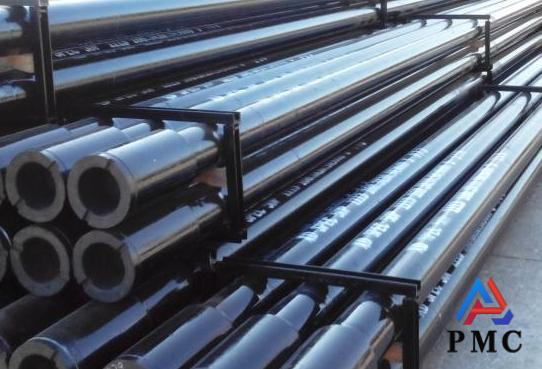
What Material should be Used for Oil Drill Pipes?
Oil drill pipe is a very important tool in the process of oil exploration and exploitation, so the choice of its material is crucial. Oil drill pipes need to have properties such as high strength, wear resistance, corrosion resistance, and high temperature resistance. Common oil drill pipes materials include carbon steel, alloy steel, stainless steel and titanium alloy. The characteristics and applicability of these materials will be introduced below.
Carbon steel is one of the commonly used materials for oil drill pipes. It has good strength and hardness, and is relatively cheap. Carbon steel oil drill pipe performs well in general exploration and drilling operations, but due to its poor corrosion resistance, it is prone to corrosion and deformation in environments containing highly corrosive media and high temperatures, so it is not suitable for use under these conditions.
Alloy steel is another commonly used material for oil drill pipes. Due to the addition of alloy elements, it has higher strength and hardness, as well as certain corrosion resistance. Alloy steel oil drill pipe is suitable for general oil exploration and drilling operations, and can meet the use requirements under general conditions to a certain extent. However, under extreme conditions, such as high temperature, high pressure, corrosive media, etc., the performance of alloy steel oil drill pipe may not meet the requirements.
Stainless steel oil drill pipe has good corrosion resistance and high temperature resistance, and is suitable for operations in environments containing highly corrosive media and high temperatures. Stainless steel oil drill pipes are usually made of stainless steel materials such as 316L or 13Cr, which can effectively extend the service life and improve work efficiency. However, due to the high price of stainless steel, the cost is relatively high, so when choosing, it is necessary to weigh the relationship between its performance and cost.
Titanium alloy oil drill pipe has extremely high strength, hardness and corrosion resistance, while being light in weight and having good tensile resistance. It is suitable for oil exploration and drilling operations under extreme conditions. Titanium alloy oil drill pipe can effectively reduce well depth, reduce drilling time and cost, and has a long service life. However, due to the high production cost and processing difficulty of titanium alloys, factors such as performance, cost and usage environment need to be comprehensively considered in practical applications.
In summary, the material selection of oil drill pipe needs to comprehensively consider factors such as performance, cost and use environment. In general, you can choose carbon steel oil drill pipe or alloy steel oil drill pipe. In high temperature and highly corrosive media, stainless steel oil drill pipe can be selected. Under extreme conditions, titanium alloy oil drill pipe can be considered. No matter what material is chosen, it is necessary to ensure that the oil drill pipe has good performance and stable quality to ensure the smooth progress of exploration and mining.

What are the characteristics of oil drill pipes compared with other materials?
1. High temperature and high pressure resistance: Oil drill pipes need to work under extremely high temperature and high pressure, so they need to have high heat resistance and pressure resistance. Oil drill pipes usually undergo strict heat treatment and surface treatment to ensure that they will not deform or break in harsh working environments.
2. Strong wear resistance: During the underground drilling process, the oil drill pipe constantly rubs against the drill bit and the well wall, and needs to have strong wear resistance to ensure the smooth progress of the drilling operation. The oil drill pipe is often made of alloy steel, which has high hardness and wear resistance.
3. High strength: Oil drill pipes need to withstand huge tensile forces and torques, so they need to have high strength. Alloy steel and stainless steel have high strength and tensile resistance, and are suitable as oil drill pipe materials.
4. Good rigidity and toughness: Oil drill pipes need to have good rigidity and toughness, be able to withstand rotation and impact loads, and not be easily deformed and broken. Carbon steel, alloy steel, and stainless steel have appropriate rigidity and toughness and are suitable for manufacturing oil drill pipes.
5. Easy to process and weld: Oil drill pipes may be damaged or worn during use and need to be repaired or replaced. Therefore, the material of oil drill pipes needs to have good processability and weldability to facilitate maintenance and repair.
In general, the comparison between oil drill pipe and other materials is mainly reflected in high temperature and high pressure resistance, strong wear resistance, high strength, good rigidity and toughness, easy processing and welding, etc. These characteristics enable oil drill pipe to work stably and reliably in harsh environments, ensuring the smooth progress of oil exploration and mining operations.
Read more: How to Choose Oil Drill Pipes Suitable for Different Geological Conditions?


